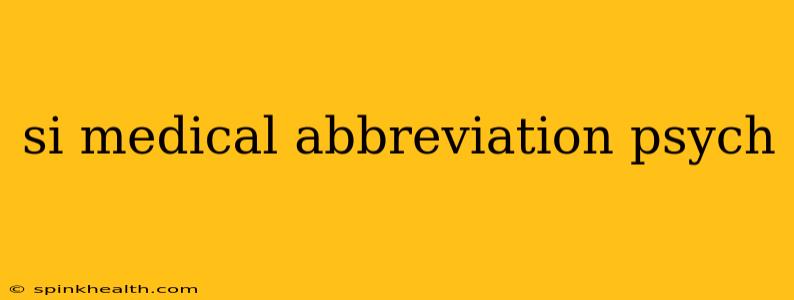Si Medical Abbreviation Psych: Unraveling the Mystery Behind the "SI" in Psychiatric Contexts
The medical abbreviation "SI" in a psychiatric context doesn't have a universally accepted, single meaning. Its interpretation heavily depends on the specific medical record, the healthcare provider's notes, and the overall clinical context. It's crucial to avoid making assumptions and always seek clarification if you encounter this abbreviation. Let's explore some possible interpretations and the importance of clear communication in healthcare:
What could "SI" stand for in a psychiatric setting?
The most common and concerning interpretation of "SI" in a psychiatric record is suicidal ideation. This refers to thoughts of harming oneself, ranging from fleeting thoughts to detailed plans. The severity of suicidal ideation can vary significantly, and it always requires careful assessment by a mental health professional. The presence of "SI" in a chart should trigger immediate attention and a thorough evaluation of the patient's risk.
However, "SI" might also represent other things, depending on the specific context. This highlights the dangers of relying on abbreviations without proper clarification. It is essential for all medical professionals to utilize complete and unambiguous terms in their documentation.
What are the different levels of suicidal ideation?
Suicidal ideation isn't a one-size-fits-all diagnosis. It exists on a spectrum, ranging from passive thoughts of death to active planning and attempts. A thorough assessment considers several factors, including:
- Frequency and intensity of thoughts: How often do these thoughts occur? How distressing are they?
- Presence of a plan: Does the individual have a specific method in mind? How detailed is the plan?
- Access to means: Does the individual have access to the means to carry out the plan (e.g., firearms, medication)?
- History of suicide attempts: Has the individual attempted suicide in the past? This significantly increases the risk.
Understanding these nuances is critical for appropriate intervention and treatment planning.
What other abbreviations are commonly used in psychiatric records?
Psychiatric records often use many abbreviations, which can be confusing if you're unfamiliar with them. Some common ones include:
- MDD: Major Depressive Disorder
- GAD: Generalized Anxiety Disorder
- PTSD: Post-Traumatic Stress Disorder
- OCD: Obsessive-Compulsive Disorder
- BP: Bipolar Disorder
- SA: Substance Abuse
Remember, these are just examples, and the meaning can vary. Always verify the meaning of any abbreviation you encounter with the medical professional who authored the record.
Why is clear communication essential in mental health care?
The consequences of misinterpreting medical abbreviations, particularly in a psychiatric setting, can be severe. Accurate and complete documentation is critical for:
- Patient safety: Clear communication ensures appropriate interventions are taken to prevent self-harm or suicide.
- Effective treatment: Accurate diagnosis and documentation guide treatment planning and ensure the most effective care.
- Legal protection: Clear and unambiguous records protect both the patient and the healthcare provider.
In conclusion, while "SI" in a psychiatric context often means suicidal ideation, it's never safe to assume. The paramount importance of clear communication in mental healthcare cannot be overstated. Always seek clarification if you are unsure about any abbreviation used in a medical record. This ensures patient safety and fosters effective, collaborative care. If you or someone you know is experiencing suicidal thoughts, please seek immediate help from a mental health professional or emergency services.

